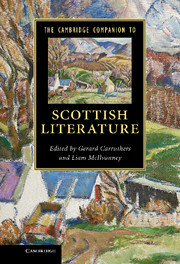Book contents
- Frontmatter
- Contents
- Notes on Contributors
- Acknowledgements
- Chronology
- Introduction
- 1 Scottish Literature before Scottish Literature
- 2 The Medieval Period
- 3 Reformation and Renaissance
- 4 The Aftermath of Union
- 5 Robert Burns
- 6 Enlightenment, Romanticism and the Scottish Canon
- 7 Scott and the Historical Novel
- 8 The Gaelic Tradition
- 9 Scottish Gothic
- 10 Victorian Scottish Literature
- 11 Robert Louis Stevenson
- 12 Hugh MacDiarmid and the Scottish Renaissance
- 13 Popular Fiction
- 14 Muriel Spark
- 15 The Glasgow Novel
- 16 ‘What is the language using us for?’
- 17 The Emergence of Scottish Studies
- 18 Otherworlds
- 19 Scottish Literature in Diaspora
- Index
- References
7 - Scott and the Historical Novel
A Scottish Rise of the Novel
Published online by Cambridge University Press: 05 January 2013
- Frontmatter
- Contents
- Notes on Contributors
- Acknowledgements
- Chronology
- Introduction
- 1 Scottish Literature before Scottish Literature
- 2 The Medieval Period
- 3 Reformation and Renaissance
- 4 The Aftermath of Union
- 5 Robert Burns
- 6 Enlightenment, Romanticism and the Scottish Canon
- 7 Scott and the Historical Novel
- 8 The Gaelic Tradition
- 9 Scottish Gothic
- 10 Victorian Scottish Literature
- 11 Robert Louis Stevenson
- 12 Hugh MacDiarmid and the Scottish Renaissance
- 13 Popular Fiction
- 14 Muriel Spark
- 15 The Glasgow Novel
- 16 ‘What is the language using us for?’
- 17 The Emergence of Scottish Studies
- 18 Otherworlds
- 19 Scottish Literature in Diaspora
- Index
- References
Summary
Walter Scott was the major novelist of the nineteenth century. ‘During the Romantic period, the “Author of Waverley” sold more novels than all the other novelists of the time put together’; a generation later he was still, ‘by several orders of magnitude, the author whose works had sold the largest number of copies in the English-speaking world.’ This popularity was accompanied by a commensurate critical prestige. The Victorians revered Scott as at once the last of the classics and the first of the moderns – the wizard who reanimated the ancient genres of ballad, epic and romance for an industrial-age reading public. His reputation stood if anything still higher outside Britain: from Russia to Italy, Ontario to Bengal, the historical novel exemplified the modernising national literary form of the novel as such. Scott’s fiction supplied a template for the epic ambitions of the next great medium of nation-making narrative, in the cinema of D. W. Griffith, and Waverley, Rob Roy, Ivanhoe and the rest continue to shape the fables of our postmodern global mass culture.
Scott’s achievement was comprehensively sidelined by the aesthetic revolutions of modernism, consolidated in Anglo-American criticism by works such as F. R. Leavis’s The Great Tradition (1948) and Ian Watt’s The Rise of the Novel (1957), which installed academic canons of moral and formal realism inhospitable to Scott’s practice. Twentieth-century taste made the Waverley Novels the literary equivalent of a Victorian municipal monument – dilapidated, unsightly, impeding the flow of traffic. The lip-service paid to Scott’s stature in the global history of the novel gave his reputation a lopsided cast: the once universally influential Great Unread, a tail without the comet. Recent decades have seen a refurbishing of that reputation, if so far confined to the academy, sustained by the new Edinburgh Edition of the Waverley Novels, a general reorientation of critical inquiry towards historicist approaches and (not least) a strong resurgence of the historical novel itself across the reading publics and credential-granting institutions of world literature.
- Type
- Chapter
- Information
- The Cambridge Companion to Scottish Literature , pp. 103 - 116Publisher: Cambridge University PressPrint publication year: 2012
References
- 12
- Cited by

